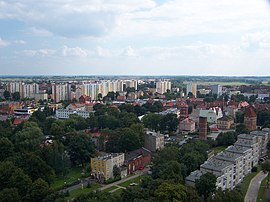Malbork
| Malbork | |||
|---|---|---|---|

City of Malbork
|
|||
|
|||
| Coordinates: 54°2′N 19°2′E / 54.033°N 19.033°E | |||
| Country |
|
||
| Voivodeship | Pomeranian | ||
| County | Malbork County | ||
| Gmina | Malbork (urban gmina) | ||
| Town rights | 1286 | ||
| Government | |||
| • Mayor | Marek Charzewski | ||
| Area | |||
| • Total | 17.15 km2 (6.62 sq mi) | ||
| Highest elevation | 30 m (100 ft) | ||
| Lowest elevation | 6 m (20 ft) | ||
| Population (2006) | |||
| • Total | 38,478 | ||
| • Density | 2,200/km2 (5,800/sq mi) | ||
| Time zone | CET (UTC+1) | ||
| • Summer (DST) | CEST (UTC+2) | ||
| Postal code | 82-200 to 82-210 | ||
| Area code(s) | +48 055 | ||
| Car plates | GMB | ||
| Website | http://www.malbork.pl | ||
Malbork [ˈmalbɔrk] (German: Marienburg (![]() listen); Latin: Civitas Beatae Virginis) is a town in northern Poland in the Żuławy region (Vistula delta), with 38,478 inhabitants (2006). Situated in the Pomeranian Voivodeship since 1999, it was previously assigned to Elbląg Voivodeship (1975–1998). It is the capital of Malbork County.
listen); Latin: Civitas Beatae Virginis) is a town in northern Poland in the Żuławy region (Vistula delta), with 38,478 inhabitants (2006). Situated in the Pomeranian Voivodeship since 1999, it was previously assigned to Elbląg Voivodeship (1975–1998). It is the capital of Malbork County.
Founded in the 13th century by the Knights of the Teutonic Order, the town is noted for its medieval Malbork Castle, built in the 13th Century as the Order's headquarters and of what later became known as Royal Prussia.
The town was built in Prussia around the fortress Ordensburg Marienburg, which was founded in 1274 on the east bank of the river Nogat by the Teutonic Knights. Both the castle and the town (named Marienburg in German and Malborg or Malbork in Polish) were named for their patron saint, the Virgin Mary. This fortified castle became the seat of the Teutonic Order and Europe's largest Gothic fortress. During the Thirteen Years' War, the castle of Marienburg was pawned by the Teutonic Order to their imperial soldiers from Bohemia. They sold the castle in 1457 to King Casimir IV of Poland in lieu of indemnities.
...
Wikipedia



